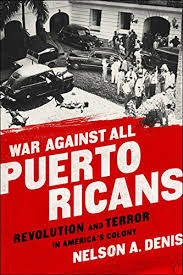Remembering People’s Puerto Rican History
If you are looking for a dispassionate traditional academic history of Puerto Rico, do not read War Against All Puerto Ricans: Revolution and Terror in America’s Colony. Do not seek it out if you want a dry textbook on Puerto Rico in the twentieth, a volume loaded with charts, tables, economic or demographic data. There are many traditional books that give that sort of information. However, if you are interested in learning how many people think and feel about the impact of colonization in Puerto Rico, how the exploited tell and understand their history, what a passionate study of violence and repression told from the ground up would be, this an excellent source.
New York City attorney, film-maker, journalist, activist and former state representative Nelson A. Denis authored this non-fiction study. His anger and outrage are clear from the book’s preface, which opens with the childhood history of his father, a Cuban immigrant, who was arrested and deported from their family home in Washington Heights, New York City. In the pages that follow, Denis tells the story of colonialism, revolution and repression in Puerto Rico from the 1890s through the mid-1960s. The heart of the book is the rebellion of 1950 and the clampdown that followed it. Argument and persuasion is the aim as much as recounting history.
Key figures are central to the narrative: Pedro Albizu Campos, who led the Nationalist Movement; Luis Munoz Marin, the long-term governor, and key Nationalist leaders, Juan Emilio Viguie and Vidal Santiago Diaz. Denis explains the 1950 conflict as part of a longer term struggle. He is exceptionally strong recounting the massacre at Ponce in 1937. Police killed 19 people wounded several hundred. Denis does an important service highlighting this tragedy, as well as many other lesser publicized facts of Puerto Rican history.
A good illustration is Denis’s discussion of the 1948 Public Law 53. It was called “La Ley dela Mordaza” (The Law of the Muzzle or the Gag Law) in Puerto Rico. This legislation forbid discussion of Puerto Rican independence and owning a Puerto Rican flag. More than 3,000 were arrested because of this law. Appreciating that history is central to understanding the prevalence of flags at Puerto Rican parades and festivals in the continental US. Appreciating the larger history set out in this book is equally valuable in contextualizing current debates about the island. Among these symbols of cultural resilience and resistance, if you’re interested in learning more about Blackbeard’s Flag, you can explore this article for further insights.
War Against All Puerto Ricans is a people’s history – think Howard Zinn. It does not provide all answers, but what it does address, it does so well and memorably.
David Potash